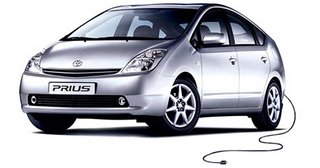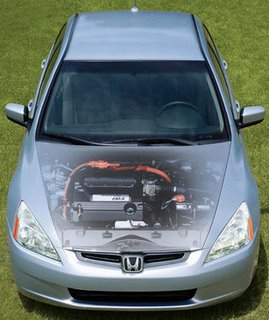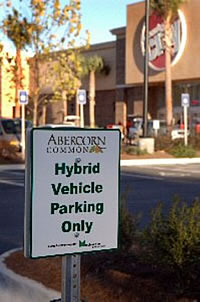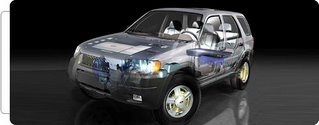YAHOO! FOR HYBRIDS
Hybrid Myths
November 30, 2006 (hybridCARS.com via Yahoo Autos)
1. You need to plug in a hybrid car.

…Auto engineers have developed an ingenious system known as regenerative braking… Energy usually lost when a vehicle is slowing down or stopping is reclaimed and routed to the hybrid's rechargeable batteries. The process is automatic…[B]ut a growing number of them wish they had a plug-in hybrid. The ability to connect a hybrid into the electric grid overnight to charge a larger set of batteries means that most of your city driving could be done without burning a single drop of gasoline.
Can you say 100 mpg? …

2. Hybrid batteries need to be replaced.
…By keeping the charge between 40% and 60% -never fully charged and never fully drained-carmakers have greatly extended the longevity of nickel metal hydride batteries.
The standard warranty on hybrid batteries and other components is between 80,000 and 100,000 miles…The U.S. Department of Energy stopped its tests of hybrid batteries-when the capacity remained almost like new-after 160,000 miles…There's little to no accurate information about the cost for replacing a hybrid battery, because it hasn't been a requirement…

3. Hybrids are a new phenomenon.
In 1900, American car companies produced steam, electric, and gasoline cars in almost equal numbers…In 1905 an American engineer named H. Piper filed the first patent for a gas-electric hybrid vehicle…The following 80 years, characterized by cheap oil, created little incentive for auto engineers to play with alternatives….Research and experimentation by governments and car companies in the 1980s and 1990s led to the reemergence of hybrids in the U.S. in 2000.
4. People buy hybrids only to save money on gas.
…Going farther on a gallon of gas-and thus reducing a car owner's tab at the pumps-is a logical advantage of a hybrid car. But car shoppers seldom buy based purely on a logical economic equation…[W]hy are more and more shoppers going hybrid? Many reasons: To minimize their impact on the environment, to help reduce the world's addiction to oil, and to earn technology bragging rights…
5. Hybrids are expensive.
At the beginning of 2006, hybrids were available in 10 different models ranging in price from $19,000 to $53,000. The most efficient models-the Insight, Civic, and Prius-are available well below $30,000…Rechargeable batteries, electric motors, and sophisticated computer controls do add to the cost of producing a hybrid car. However, as production numbers increase, economies of scale are expected to reduce those costs…In the meantime, the hybrid premium-usually estimated at $3,000-is mitigated by federal and state tax incentives, lower maintenance costs, and extraordinarily strong resale values… 6. Hybrids are small and underpowered.

The Honda Accord hybrid is the fastest family sedan on the market. The Lexus Rx400h and Toyota Highlander Hybrid share the same 270 horsepower system. The Lexus GS 450h hybrid sedan exceeds 300 horsepower with 0-to-60 performance below six seconds. And the Toyota Volta concept is a 408-horsepower scream machine…General Motors' two-mode hybrid system, rolling out later this year in the Chevy Tahoe, is designed specifically to give drivers of full-size SUVs a V8 highway cruising experience and towing power-without draining the gas tank.

7. Only liberals buy hybrids.
… Americans of all political stripes have become more aware of the economic and political costs of oil dependency…petrodollars end up in the hands of repressive Middle East regimes…we fund both sides of the war on terror…autoworkers have grown more interested in fuel-saving technologies…Conserving fuel is now being championed as a way to tackle national security, jobs, and climate change, all at the same time…

8. Hybrids pose a threat to first responders.
…Knowing a few basic things about hybrids-the location and construction of battery compartments, the color (orange) used to designate high voltage cables, and the location of fuses that will isolate the electrical system-is enough to help first responders save lives and remain safe in the process…
9. Hybrids will solve all our transportation, energy, and environmental problems.
…The 200,000 hybrid car sales in 2005 represent 1.2% of the 17 million new cars sold last year…We could reach the major milestone of 1 million hybrid cars on American roads sometime in 2007 or 2008…there are approximately 200 million cars in America today-and over 700 million vehicles worldwide. If car numbers keep increasing at the present rate, there will be more than a billion cars and trucks on the road across the world in 20 years…Hybrid cars can only be viewed as a partial solution.

10. Hybrid technology is only a fad.
Hybrid technology is often pitted against fuel cells, diesel engines, and/or hydrogen as the silver bullet approach to sustainable mobility…on Dec. 1, 2005, the International Energy Agency (IEA) concluded that even under the most favorable conditions, hydrogen vehicles would represent 30% of the global fleet by 2050…The debate over the future of automotive technology has now turned toward finding the best ways to combine systems and fuels in a single hybrid vehicle…








0 Comments:
Post a Comment
<< Home